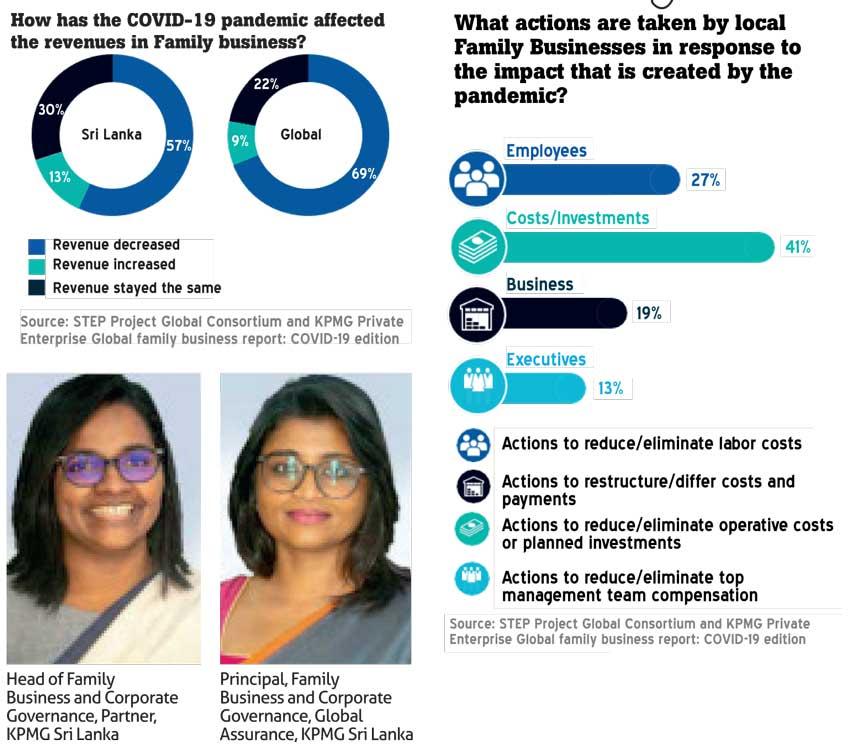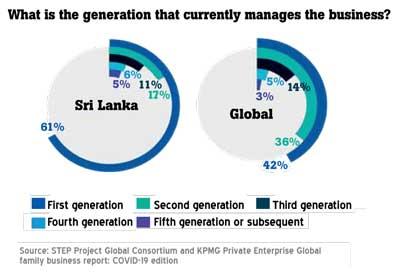Reply To:
Name - Reply Comment

The Transgenerational Entrepreneurship Practices (STEP) Project, Global Consortium and KPMG Private Enterprise came together in June of 2020 to find out what family business leaders around the world were doing to respond to the impact of COVID-19. Data was collected in the global family business survey: COVID-19 edition between June and October 2020. A total of 2,493 family business leaders in Europe, the Americas, Asia and the Middle East and Africa completed the survey.
 Many families in Sri Lanka also participated in this survey, with a lot of enthusiasm and a country benchmarking report was issued specific to Sri Lanka along with the global survey. This is the first family business survey with global comparison done for Sri Lanka.
Many families in Sri Lanka also participated in this survey, with a lot of enthusiasm and a country benchmarking report was issued specific to Sri Lanka along with the global survey. This is the first family business survey with global comparison done for Sri Lanka.
The impact on the revenue of local family businesses in comparison to global businesses is in a similar content but may change as the comprehensive economic impact of the global pandemic will only be fully uncovered within the next two years.
Further, based on the previous global economic crisis, it was evident that family businesses are more resilient to economic challenges than non-family corporates, due to its many unique characteristics.
Actions taken in countering the pandemic challenge appear to be less severe in Sri Lanka when compared to businesses in the global context. Reduction of operative costs and slowdown in planned investments was the most common action adopted by family businesses both in Sri Lanka and globally. Employee termination was more evidently visible in local non-family-owned businesses than among family-owned businesses, which is mainly attributed to the close relationship maintained between the founder generation and their employees as well as the fact that family businesses are heavily value driven.
In Sri Lanka, it was also evident that due to their values-driven nature, many families in senior management roles opted to compromise their own remuneration as a strategy to protect their workforce. Reflective of the global trend, local family-owned businesses actively engaged in revisiting payment and lending terms with vendors and debtors, as a remedial in remaining resilient to the pandemic crisis.
Overall, in terms of responsive actions taken by family-owned businesses to reduce the impact of the pandemic, a similar trend to that of the global stance is apparent in Sri Lanka. Three common trends were noted.
1. Social responsibility
Decision-making considered social responsibility, addressing the impact of the pandemic on the welfare of employees, society as a whole and the needs of all their stakeholders, including customers, suppliers and local communities. Successful family-owned businesses understand that success of a business in only long term if the key stakeholders are safeguarded adequately. Such decision-making is apparent in family businesses because the owners have a long-term view in all the decisions they make for the business.
2. Business transformation
Ability to make quick decisions and flexibility helped family-owned businesses in pivoting their businesses reactively to address the impact of COVID-19 and proactively to ensure that new business models included transformational strategies. They were faster to implement such decisions to gain competitive advantages. It was also seen that some families used the time pandemic provided to pause, rethink on operational inefficiencies and ‘clean up’ legacy matters that had been pushed behind.
3. Exercising patience
It was also seen how these businesses took time to understand the full impact of COVID-19 on their business and others in their industry while also observing the immediate actions that many of their competitors were required to take. It was noted the patient way the market was observed before certain decisions were made.
Strategies for long term
After taking immediate actions to cushion the financial shock of COVID-19, families returned their attention to familiar territory: developing longer-term strategies and sustaining the purpose and non-economic value that the family derives from owning and managing the business. That deep sense of purpose was evident in the ways in which business families supported their communities and a wide range of stakeholders from their employees through to customers and suppliers.
For many family businesses, an unexpected and positive outcome of the pandemic was the gift of time. With a slowdown in their business operations, several family business leaders found they had the time and agility to diversify, to explore ideas for new products, new markets and extensions of their businesses that had been simmering in the background for years.
In fact, family businesses were 42 percent more likely to deploy a business transformation strategy than non-family firms. Many also took the time to look seriously at ways to streamline their operations, including accelerating the implementation of new digital solutions and to focus on important family issues, such as succession planning and their ownership structures.